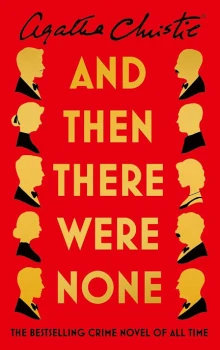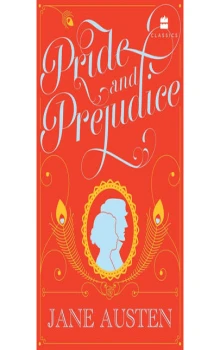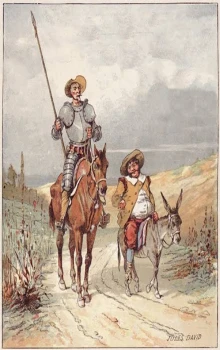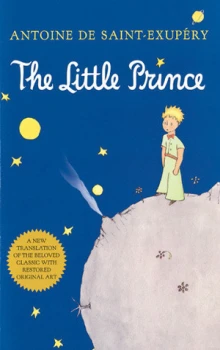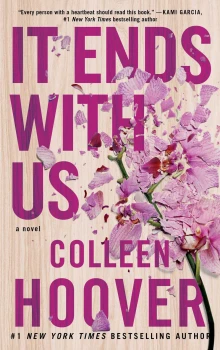I
It was so sudden and so unexpected that it took every
one’s breath away. They remained stupidly staring at
the crumpled figure on the ground.
Then Dr Armstrong jumped up and went over to
him, kneeling beside him. When he raised his head his
eyes were bewildered.
He said in a low awe-struck whisper:
‘My God! he’s dead.’
They didn’t take it in. Not at once.
Dead? Dead? That young Norse God in the prime of
his health and strength. Struck down all in a moment.
Healthy young men didn’t die like that, choking over
a whisky and soda…
No, they couldn’t take it in.
Dr Armstrong was peering into the dead man’s face.
He sniffied at the blue twisted lips. Then he picked up the
glass from which Anthony Marston had been drinking.
85
p q
General Macarthur said:
‘Dead? D’you mean the fellow just choked and –
and died?’
The physician said:
‘You can call it choking if you like. He died of
asphyxiation right enough.’
He was sniffing now at the glass. He dipped a finger
into the dregs and very cautiously just touched the
finger with the tip of his tongue.
His expression altered.
General Macarthur said:
‘Never knew a man could die like that – just of a
choking fit!’
Emily Brent said in a clear voice:
‘In the midst of life we are in death.’
Dr Armstrong stood up. He said brusquely:
‘No, a man doesn’t die of a mere choking fit.
Marston’s death wasn’t what we call a natural death.’
Vera said almost in a whisper:
‘Was there – something – in the whisky?’
Armstrong nodded.
‘Yes. Can’t say exactly. Everything points to one
of the cyanides. No distinctive smell of Prussic Acid,
probably Potassium Cyanide. It acts pretty well instantly.’
The judge said sharply:
‘It was in his glass?’
86
And Then There Were None
‘Yes.’
The doctor strode to the table where the drinks were.
He removed the stopper from the whisky and smelt
and tasted it. Then he tasted the soda water. He shook
his head.
‘They’re both all right.’
Lombard said:
‘You mean – he must have put the stuff in his glass
himself?’
Armstrong nodded with a curiously dissatisfied
expression. He said:
‘Seems like it.’
Blore said:
‘Suicide, eh? That’s a queer go.’
Vera said slowly:
‘You’d never think that he would kill himself. He
was so alive. He was – oh – enjoying himself ! When
he came down the hill in his car this evening he looked
– he looked – oh I can’t explain!’
But they knew what she meant. Anthony Marston,
in the height of his youth and manhood, had seemed
like a being who was immortal. And now, crumpled
and broken, he lay on the floor.
Dr Armstrong said:
‘Is there any possibility other than suicide?’
Slowly every one shook their heads. There could
be no other explanation. The drinks themselves were
87
p q
untampered with. They had all seen Anthony Marston
go across and help himself. It followed therefore that
any cyanide in the drink must have been put there by
Anthony Marston himself.
And yet – why should Anthony Marston commit
suicide?
Blore said thoughtfully:
‘You know, doctor, it doesn’t seem right to me. I
shouldn’t have said Mr Marston was a suicidal type of
gentleman.’
Armstrong answered:
‘I agree.’
II
They had left it like that. What else was there to say?
Together Armstrong and Lombard had carried the
inert body of Anthony Marston to his bedroom and
had laid him there covered over with a sheet.
When they came downstairs again, the others were
standing in a group, shivering a little, though the night
was not cold.
Emily Brent said:
‘We’d better go to bed. It’s late.’
It was past twelve o’clock. The suggestion was a wise
one – yet every one hesitated. It was as though they
88
And Then There Were None
clung to each other’s company for reassurance.
The judge said:
‘Yes, we must get some sleep.’
Rogers said:
‘I haven’t cleared yet – in the dining-room.’
Lombard said curtly:
‘Do it in the morning.’
Armstrong said to him:
‘Is your wife all right?’
‘I’ll go and see, sir.’
He returned a minute or two later.
‘Sleeping beautiful, she is.’
‘Good,’ said the doctor. ‘Don’t disturb her.’
‘No, sir. I’ll just put things straight in the dining-
room and make sure everything’s locked up right, and
then I’ll turn in.’
He went across the hall into the dining-room.
The others went upstairs, a slow unwilling procession.
If this had been an old house, with creaking wood,
and dark shadows, and heavily panelled walls, there
might have been an eerie feeling. But this house was
89
p q
the essence of modernity. There were no dark corners –
no possible sliding panels – it was flooded with electric
light – everything was new and bright and shining.
There was nothing hidden in this house, nothing concealed.
It had no atmosphere about it.
Somehow, that was the most frightening thing of
all…
They exchanged good-nights on the upper landing.
Each of them went into his or her own room, and
each of them automatically, almost without conscious
thought, locked the door.
91
IV
p q
Downstairs in the dining-room, Rogers stood puzzled.
He was staring at the china figures in the centre of
the table.
He muttered to himself:
‘That’s a rum go! I could have sworn there were ten
of them.’
V
General Macarthur tossed from side to side.
Sleep would not come to him.
In the darkness he kept seeing Arthur Richmond’s
face.
He’d liked Arthur – he’d been damned fond of
Arthur. He’d been pleased that Leslie liked him too.
Leslie was so capricious. Lots of good fellows that
Leslie would turn up her nose at and pronounce dull.
‘Dull!’ Just like that.
But she hadn’t found Arthur Richmond dull. They’d
got on well together from the beginning. They’d talked
of plays and music and pictures together. She’d
teased him, made fun of him, ragged him. And he,
Macarthur, had been delighted at the thought that
92
And Then There Were None
Leslie took quite a motherly interest in the boy.
Motherly indeed! Damn’ fool not to remember that
Richmond was twenty-eight to Leslie’s twenty-nine.
He’d loved Leslie. He could see her now. Her heart-
shaped face, and her dancing deep grey eyes, and the
brown curling mass of her hair. He’d loved Leslie and
he’d believed in her absolutely.
Out there in France, in the middle of all the hell of
it, he’d sat thinking of her, taken her picture out of
the breast pocket of his tunic.
And then – he’d found out!
It had come about exactly in the way things happen
in books. The letter in the wrong envelope.
She’d been writing to them both and she’d put her
letter to Richmond in the envelope addressed to her
husband. Even now, all these years after, he could
feel the shock of it – the pain…
God, it had hurt!
And the business had been going on some time.
The letter made that clear. Weekends! Richmond’s
last leave…
Leslie – Leslie and Arthur!
God damn the fellow! Damn his smiling face, his
brisk ‘Yes, sir.’ Liar and hypocrite! Stealer of another
man’s wife!
It had gathered slowly – that cold murderous rage.
He’d managed to carry on as usual – to show nothing.
93
p q
He’d tried to make his manner to Richmond just
the same.
Had he succeeded? He thought so. Richmond hadn’t
suspected. Inequalities of temper were easily accounted
for out there, where men’s nerves were continually
snapping under the strain.
Only young Armitage had looked at him curiously
once or twice. Quite a young chap, but he’d had
perceptions, that boy.
Armitage, perhaps, had guessed – when the time
came.
He’d sent Richmond deliberately to death. Only
a miracle could have brought him through unhurt.
That miracle didn’t happen. Yes, he’d sent Richmond
to his death and he wasn’t sorry. It had been easy
enough. Mistakes were being made all the time, of-
ficers being sent to death needlessly. All was confusion,
panic. People might say afterwards ‘Old Macarthur lost
his nerve a bit, made some colossal blunders, sacri-
ficed some of his best men.’ They couldn’t say more.
But young Armitage was different. He’d looked at his
commanding officer very oddly. He’d known, perhaps,
that Richmond was being deliberately sent to death.
(After the War was over – had Armitage talked?)
Leslie hadn’t known. Leslie had wept for her lover
(he supposed) but her weeping was over by the time
94
And Then There Were None
he’d come back to England. He’d never told her that
he’d found her out. They’d gone on together – only,
somehow, she hadn’t seemed very real any more.
And then, three or four years later she’d got double
pneumonia and died.
That had been a long time ago. Fifteen years –
sixteen years?
And he’d left the Army and come to live in Devon
– bought the sort of little place he’d always meant to
have. Nice neighbours – pleasant part of the world.
There was a bit of shooting and fishing. He’d gone to
church on Sundays. (But not the day that the lesson
was read about David putting Uriah in the forefront of
the battle. Somehow he couldn’t face that. Gave him
an uncomfortable feeling.)
Everybody had been very friendly. At first, that is.
Later, he’d had an uneasy feeling that people were
talking about him behind his back. They eyed him
differently, somehow. As though they’d heard some-
thing – some lying rumour…
(Armitage? Supposing Armitage had talked.)
He’d avoided people after that – withdrawn into
himself. Unpleasant to feel that people were discus-
sing you.
And all so long ago. So – so purposeless now.
Leslie had faded into the distance and Arthur Richmond
too.
Nothing of what had happened seemed to matter
any more.
95
p q
It made life lonely, though. He’d taken to shunning
his old Army friends.
(If Armitage had talked, they’d
